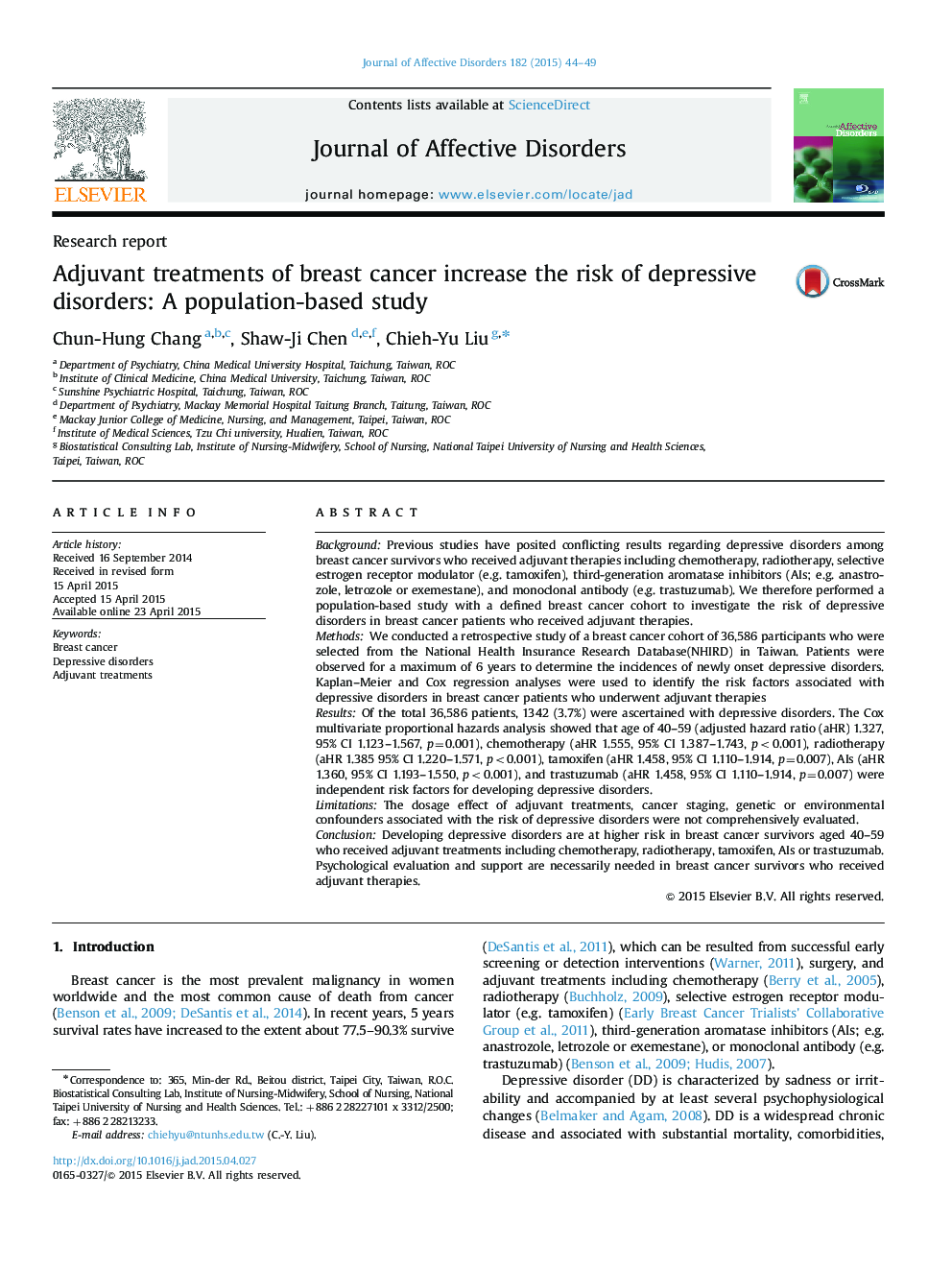| کد مقاله | کد نشریه | سال انتشار | مقاله انگلیسی | نسخه تمام متن |
|---|---|---|---|---|
| 6231522 | 1608143 | 2015 | 6 صفحه PDF | دانلود رایگان |
- A population-based breast cancer survivors (n=36,586) whom were followed up for developing depression for 6 years (January 1 2002 to December 31 2007).
- Among 36,586 breast cancer survivors, 1342 patients (3.67%) were diagnosed with depressive disorders during the follow-up period.
- These results indicated that a subsequent risk of depressive disorders in patients with breast cancer at the age of 40-59, and the risk increased for those who underwent adjuvant therapies including chemotherapy, radiotherapy, tamoxifen, AIs or trastuzumab.
BackgroundPrevious studies have posited conflicting results regarding depressive disorders among breast cancer survivors who received adjuvant therapies including chemotherapy, radiotherapy, selective estrogen receptor modulator (e.g. tamoxifen), third-generation aromatase inhibitors (AIs; e.g. anastrozole, letrozole or exemestane), and monoclonal antibody (e.g. trastuzumab). We therefore performed a population-based study with a defined breast cancer cohort to investigate the risk of depressive disorders in breast cancer patients who received adjuvant therapies.MethodsWe conducted a retrospective study of a breast cancer cohort of 36,586 participants who were selected from the National Health Insurance Research Database(NHIRD) in Taiwan. Patients were observed for a maximum of 6 years to determine the incidences of newly onset depressive disorders. Kaplan-Meier and Cox regression analyses were used to identify the risk factors associated with depressive disorders in breast cancer patients who underwent adjuvant therapiesResultsOf the total 36,586 patients, 1342 (3.7%) were ascertained with depressive disorders. The Cox multivariate proportional hazards analysis showed that age of 40-59 (adjusted hazard ratio (aHR) 1.327, 95% CI 1.123-1.567, p=0.001), chemotherapy (aHR 1.555, 95% CI 1.387-1.743, p<0.001), radiotherapy (aHR 1.385 95% CI 1.220-1.571, p<0.001), tamoxifen (aHR 1.458, 95% CI 1.110-1.914, p=0.007), AIs (aHR 1.360, 95% CI 1.193-1.550, p<0.001), and trastuzumab (aHR 1.458, 95% CI 1.110-1.914, p=0.007) were independent risk factors for developing depressive disorders.LimitationsThe dosage effect of adjuvant treatments, cancer staging, genetic or environmental confounders associated with the risk of depressive disorders were not comprehensively evaluated.ConclusionDeveloping depressive disorders are at higher risk in breast cancer survivors aged 40-59 who received adjuvant treatments including chemotherapy, radiotherapy, tamoxifen, AIs or trastuzumab. Psychological evaluation and support are necessarily needed in breast cancer survivors who received adjuvant therapies.
Journal: Journal of Affective Disorders - Volume 182, 15 August 2015, Pages 44-49
